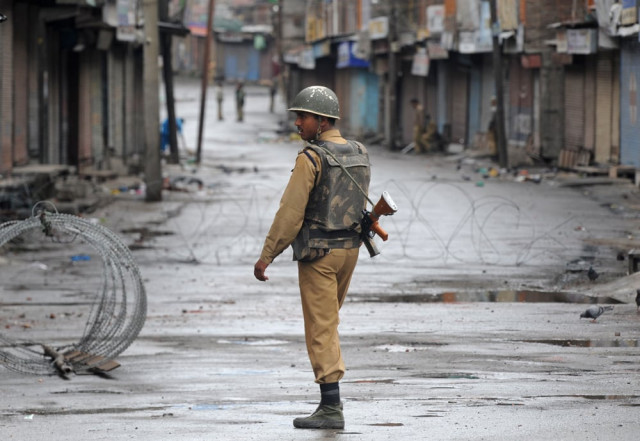Emergency law to be relaxed in Indian Kashmir
AFSPA has long been the target of human rights groups, which accuse the army of abusing powers given under the act.

Emergency law to be relaxed in Indian Kashmir
The change marks a significant step in the process of normalising the Indian part of Kashmir.
Indian Kashmir was once one of the most dangerous places on Earth as militant groups waged a deadly campaign of bombings and killings to protest against rule from New Delhi.
The draconian Armed Forces Special Powers Act (AFSPA) was introduced in 1990 to give the army and paramilitary forces, who number half a million today, sweeping powers to detain people, use deadly force and destroy property.
"Time has come for the revocation of laws which were implemented in the state after the onset of militancy," Kashmir Chief Minister Omar Abdullah told a police function in the main city of Srinagar on Friday.
"These laws will be revoked from some areas of the state within next few days," he said, without specifying where.
Violence is at its lowest ebb since the start of the insurgency in 1989 and life is slowly returning to normal in a region where the streets used to be deserted after 5:00 pm when security forces imposed a strict curfew.
Tourism has also burst back into life, with visitor numbers at a two-decade high as Indians return to the steep valleys, lakes and mountain views of the "Switzerland of the East."
AFSPA has long been the target of human rights groups, which accuse the army of abusing the powers given to it under the act, and is deeply resented by Kashmiris who see it as a gross injustice.
Police sources told AFP that six districts would be affected by the change, including the summer capital Srinagar and winter capital Jammu, but the law would remain in place along the de facto border with Pakistan.
Abdullah wrote on his Twitter account that "for some it'll be too much, for others not enough, but the way I see it, it will be a significant beginning, however small."
Under AFSPA, soldiers are given sweeping powers of detention, are able to shoot alleged militants and destroy any property suspected of being used as a militant hideout.
They cannot be prosecuted unless the Indian government gives prior sanction.
India's home ministry has pushed for revocation of the act in Kashmir but senior figures in the army have spoken against any change in the application of the law, saying it could hamper their ability to find and kill militants, who still launch occasional attacks.
UN special rapporteur Margaret Sekaggya called on the Indian government to repeal AFSPA in January after a tour of Kashnir during which she heard "numerous testimonies" of torture, ill-treatment and arbitrary detentions.
Some locals welcomed the move.
"It will mean a lot to us. At least security forces will be held accountable for their actions," said shopkeeper Mohammed Yusuf, 68. "If peace prevails, I am hopeful these laws will be lifted from the entire state," he said.
Khurram Pervez, the region's leading human rights activist, said the step by Abdullah was not enough.
"Partial removal of these draconian laws will not be very helpful," he told AFP.
"It will leave lot of space for perpetuators," he said, explaining that someone could be arrested in a place where AFSPA was not in force and then taken to an area falling under the act and killed there.
"These laws should go from the entire state and not in patches," he said.
Pervez's group Coalition of Civil Society says some 8,000 people have disappeared in the region, most of them after being arrested by the government forces. Officials put the number of missing at 1,000-3,000.
Militant violence has dropped sharply in Kashmir since India and Pakistan, which each hold the region in part but claim it in full, started a peace process in 2004.



















COMMENTS
Comments are moderated and generally will be posted if they are on-topic and not abusive.
For more information, please see our Comments FAQ